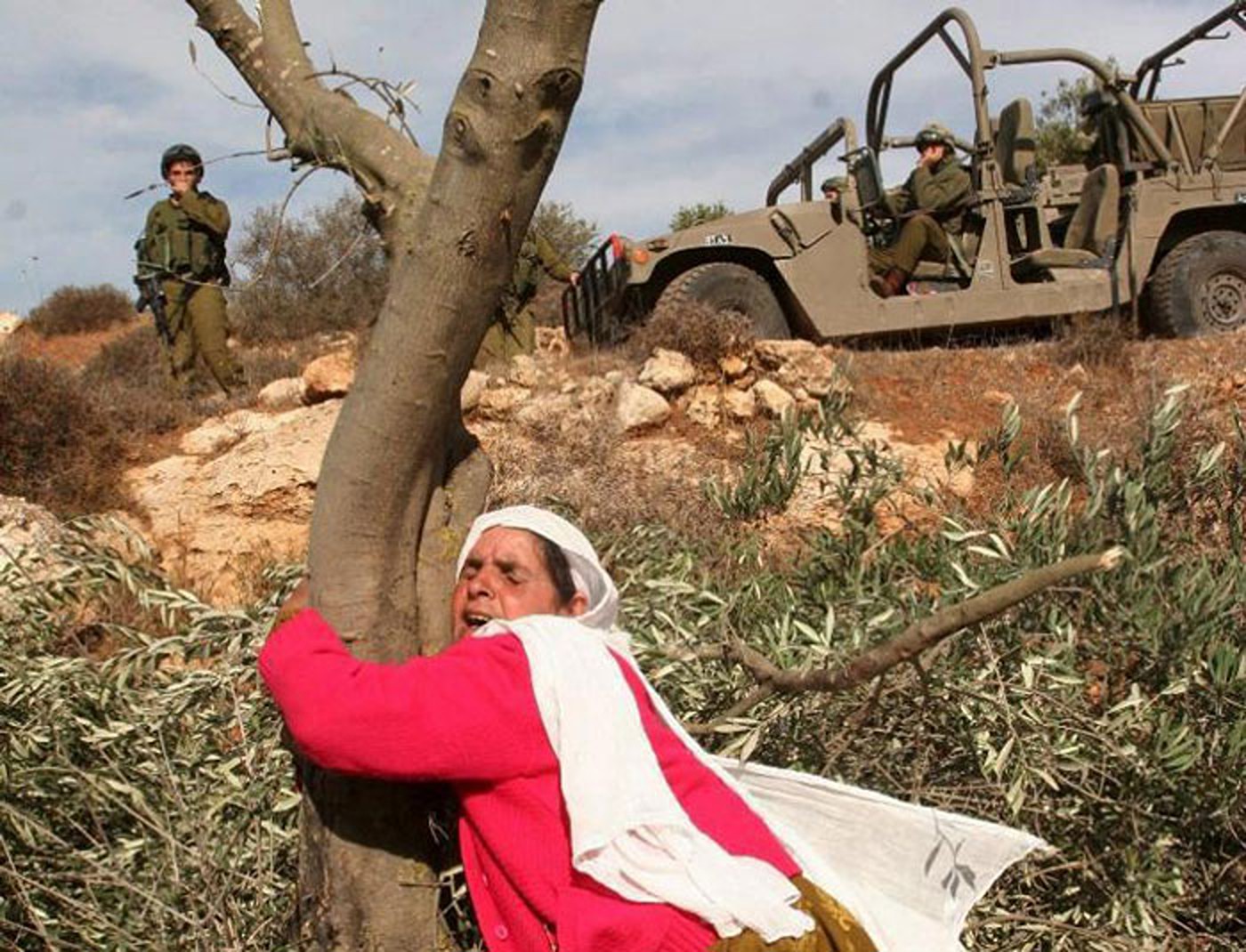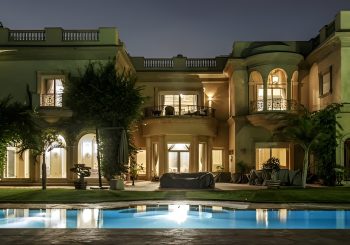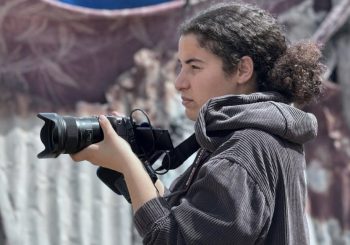The scorching sun bore down on the backs of Palestinian farmers, Amer Mustapha and Fawzi Hussein, as they trudged up hills towards their olive groves nestled under the gaze of the Israeli settlement of Yizhar, where settlers had intimidated the Palestinians, making it nearly impossible for them to tend to their olive groves – their lifeline and heritage.
As they reached the summit of the hill, the scene before them was one of utter devastation. The olive trees, once a symbol of life and resilience, have been destroyed and hacked in two.
“This is worse than losing a child,” Amer Mustapha said. “You can have another child, but you can’t replace these trees.”
In a statement, the Yitzhar settlement said that although they were “happy” that Palestinians would no longer have an excuse to visit the area, they did not know who had damaged the trees. In a similar statement, the Israeli Settlers Council, which represents all of the settlers in the West Bank, accused the Palestinians of using the olive trees as a pretext to plan an attack.
The story of Amer Mustapha and Fawzi Hussein took place in 2003, but twenty years later, nothing has changed. Escalating recent tensions in the West Bank, which coincide with the beginning of the olive season, has led to a rise in violence, impacting communities and raising concerns for Palestinian civilian safety.
The fight against climate change and environmental degradation often gets portrayed as a one-size-fits-all battle, with sleek wind farms and shiny solar panels as symbols of victory.
However, climate action looks vastly different across the globe, as diverse as the communities it impacts. For some nations and communities, it’s not about building windmills, but about dismantling the very structures that perpetuate environmental injustice.
In Palestine, Olive Trees are More Than Just Trees
Beyond their financial value, olive trees hold special meaning for Palestinians. Palestine, in fact, has some of the world’s oldest olive trees, dating back to 4,000 years. These trees represent the people’s loyalty to their homeland and are unlike just any other tree; they symbolize Palestinian persistence and resilience because they can withstand droughts and can grow in poor soil conditions.
The olive harvest season, a two-month window between October and November, represents the fragile lifeline for roughly 80,000 to 100,000 Palestinian families. This crucial period, where more than 15 percent of working women rely on olive-related income, generates vital revenue of USD 160 million (EGP 4.9 billion) to USD 191 million (EGP 5.9 billion) per year. However, this dependence also exposes these families to economic vulnerability, highlighting the importance of safeguarding this vital sector.
Deliberate uprooting and burning of olive trees have scarred landscapes and devastated livelihoods. These acts are not just attacks on trees; they are attacks on Palestinians’ heritage, identity, and their very existence.
Following the 7 October attacks in Israel, Palestinian and international NGOs have reported an increase in olive tree uprooting, burning, and vandalism by Israeli settlers. They argue that settlers, whose presence on occupied Palestinian land is deemed illegal under international law, are exploiting the heightened security concerns in Israel to advance their own political agenda.
Earlier this year, Israeli Finance Minister Bezalel Smotrich, proposed restricting Palestinian olive harvesting near West Bank settlements. He advocated for “sterile zones” around settlements and access roads, barring Palestinian access.
Satellite imagery also shows Israeli armored vehicles stationed close to a desalination plant and a wastewater treatment facility in Gaza City since 27 October. The move raises concerns about potential disruption to vital water infrastructure.
Since Israel gained control of over 80 percent of the West Bank’s water reservoirs and most other areas of Palestinian life in the 1990s interim peace deals, water problems have plagued Palestinian towns and cities throughout the West Bank.
The agreements established a Palestinian government with limited autonomy, which would procure water from Israel’s state-run utility and draw from the rapidly diminishing reservoirs it shares with Israel to supply its expanding towns. The agreement left the Palestinians isolated and surrounded by illegal Israeli settlements, cut off from both the Israeli and Palestinian water networks, in the 60 percent of the West Bank that is still under complete Israeli civil administration.
Palestinian farmers must also apply for permits to gain access to their own land. These permits must be renewed on a regular basis and can also be denied.
Data from B’Tselem, an Israeli human rights organization, shows a substantial difference in water allocation between Israeli settlers and Palestinians. While settlers receive an average of 247 liters per day, Palestinians in communities lacking water infrastructure receive only 26 liters. Even in connected communities, Palestinians receive considerably less water than settlers, with an average allocation of 82.4 liters.
In villages across the occupied West Bank, residents report struggling to secure sufficient water for basic needs like hygiene and sanitation, highlighting the challenges in maintaining agricultural practices and food security.
Since 1967, an estimated 2.5 million trees, one-third of which are precious olive trees, have been uprooted. This devastating loss has not only decimated Palestinian landscapes but also inflicted a crippling blow on the economy.
The Applied Research Institute Jerusalem estimates that the uprooting has cost the Palestinian people over USD 55 million (EGP 1.7 billion) in lost olive production alone, a stark reminder of the human cost of environmental destruction.
Unionizing Agriculture to Combat Environmental Injustice
The Palestinian struggle is complex and includes both human rights violations and political dispossession. However, there is one important component that is frequently disregarded: environmental injustice. The lives and livelihoods of Palestinians are significantly impacted by this injustice, which takes many forms.
To truly tackle this climate crisis, we must shift our focus: from technocratic solutions to empowering communities, from distant boardrooms at climate conferences to the voices of farmers and workers on the frontlines.
Environmental injustice, the disproportionate burden of pollution and resource depletion on marginalized communities, are the root of the climate crisis. When frontline communities are silenced, their land exploited, and their access to resources denied, the very ecosystems that sustain us are threatened.
The solution? Unionizing farmers and workers across borders, building solidarity across cultures and landscapes.
Palestinian farmers are banding together to fight for their land rights, a core facet of their struggle against colonization and human rights deprivation. Organizations like the Union of Agricultural Work Committees (UAWC) and the Palestine Institute for Biodiversity and Sustainability (PIBS) are playing a crucial role in this grassroots movement.
UAWC acts as a central hub for local agricultural committees across the West Bank and Gaza. These committees number over 120 and represent diverse communities, from bustling cities to remote rural areas and even refugee camps. Notably, women hold at least one-third of the membership in each committee, ensuring a strong voice for gender equality in the fight for land rights.
In order to preserve a link with Palestine’s natural land and to guarantee food sovereignty, UAWC also maintains a national seed bank that stocks native Palestinian seeds. As part of the largest global peasant movement, La Via Campesina, UAWC coordinates the efforts of farmers and peasants to promote their rights to land rights, food sovereignty, and climate justice.
Ultimately, it is imperative to increase support and funding for climate groups working with Palestinians. By empowering these organizations, we empower the Palestinian people to become active participants in shaping their own environmental future. We invest not just in a greener planet, but in a future where justice and sustainability go hand in hand.
The opinions and ideas expressed in this article are the author’s and do not necessarily reflect the views of Egyptian Streets’ editorial team. To submit an opinion article, please email [email protected].





Comments (0)